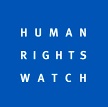By Hadi Fornaji.

Tripoli, 4 October 2013:
The advocacy group Human Rights Watch has . . .[restrict]called on Libya’s Supreme Court to suspend all death sentences so far handed down to Qaddafi-era figures, on the grounds that the trials were suspect and that in any event, Libya should abandon the capital punishment.
HRW said that since 2012, at least 16 sentences of death have been given by military or civil courts to detainees and another 12 to individuals convicted in absentia. Some of these punishments have been made against common criminals. None has yet been carried out.
HRW has cited in particular the case of Ahmed Ibrahim and Walid Dabnoon, sentenced to death by firing squad after being convicted in Misrata of crimes including murder and kidnapping. Ibrahim, said HRW was found guilty of “inciting civil war and creating discord among the population,” complicity in the kidnapping and killing of members of a family in Sirte perceived to be anti-Qaddafi. The accusations also included “spreading false rumours and fabrications during the state of war with the aim of terrorising the population” and committing acts that “endanger the general public.”
HRW claimed that lawyers for Ibrahim, a former Qaddafi-era official and Dabnoon, a volunteer fighter in 2011 with pro-Qaddafi forces, have told them that they were not able to meet with their clients privately nor to question key witnesses.
HRW maintains that lawyers were not present during the prosecutors’ interrogations of the two men. It also says that during the court proceedings, the presiding judge rejected the defence lawyers’ requests to summon key witnesses for cross-examination. HRW said that the court relied on allegedly coerced confessions by co-defendants, who incriminated Ibrahim and Dabnoon.
Ibrahim and Dabnoon had appealed the conviction on 22 September, thus setting in motion the process for a Supreme Court review of the death sentences. Under Libya’s Code for Criminal Procedures, the Supreme Court needs to confirm the death sentences and then the High Judicial Council needs to give final approval.
Joe Stork, HRW’s acting MENA director said: “These tainted sentences contradict Libya’s commitment to uphold international fair trial standards. Given the number of people now on death row and the general state of disarray in Libya’s justice system, Libya should impose an immediate moratorium on capital punishment.”
HRW asserted: “Human rights law upholds every human being’s inherent right to life. For countries that have not agreed to ban the death penalty completely, it limits the death penalty to the most serious crimes, typically crimes resulting in death.
“In Libya, the death penalty appears frequently in legislation as a proposed punishment for various crimes. Provisions for the death penalty can be found in at least 30 articles of the Libyan Penal Code, including for acts of a political nature, sabotage and forming any organisations or formations deemed ‘illegal’ without further specifying the prohibition”. [/restrict]






